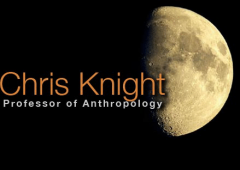Professor Alex Walter, Rutgers University
This book may be the most important ever written on the evolution of human social organization. It brings together observation and theory from social anthropology, primatology, and paleoanthropology in a manner never before equalled. The author, Chris Knight, who teaches social anthropology at the University of East London, is up to date on all these fields and has achieved an extraordinary synthesis. His critiques of Claude Lévi-Strauss on totemism and myth are a sheer tour de force. The basic premise can be summarised, though only in an extremely cursory fashion, as follows. The basis of primate social organization is predicated on the distribution of food resources and how many females array themselves around these. Males array themselves around females. Over the course of human evolution, the acquisition of animal protein came to be of critical significance. Proto-human females acquired this valuable resource from males via a collective bargaining agreement which formed the basis of human kinship organization and social exchanges. This accomplished through a systematic ‘sex-strike’ cycle which ran according to a lunar based schedule of menstruation/hunting following ovulation/feasting. Human females evolved concealed ovulation and a cultural system of sexual advertisement based on menstruation that guided this cycle. Females could now say ‘yes’, but they could also say ‘no’, depending on the success of the hunting venture. The author explores evidence for this thesis both in the ethnography of currently existing non-industrial societies as well as in the paleolithic in the use that anatomically modern humans made of red ochre and other pigments to signify and exploit the menstrual event. A number of previously incomprehensible myths, such as the ‘Rainbow Snake’ of the Australian Aborigines, receive a new and revealing interpretation in this light.
Professor Alex Walter, Rutgers University. Amazon.com book review. aewalter@hotmail.com
